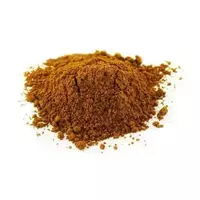Carob

Do you know what a pot is? This specific name may be familiar exclusively to cookers and confectioners, as the pot is an ideal cocoa substitute for chocolate and other confectionery. And it is ideal because it is not addictive and addictive, as is often the case with chocolate. Well, let's dwell on this product and look at its properties.
Carob is the fruit of an evergreen carob tree called "Cepatonia siliqua L, " whose homeland is called Mediterranean countries such as Cyprus, Spain, Italy and others. The sweet powder used in the confectionery business is obtained from dried pods that are completely inedible in raw form. Once harvested, they are laid out under the sun's rays to dry out and eventually develop a sweet taste. The calorie content of the karob is 222 kcal per 100 grams of bulk matter.
Both in appearance and taste, the pot resembles cocoa, only its color is not so bright brown, but with a hint of pink. In cooking, the beneficial properties of the carob are simply ideal for giving density, shine and viscosity to the finished product. This is due to the fact that the fruits of the locust tree contain the so-called resin or gum, which is used as a thickener and stabilizer. The powder of these fruits is used in the manufacture of glazes (both dark and white), while the color and aroma of the finished product does not change. Pastries, sweets, puddings, bars. . . you can make absolutely any sweet dishes, replacing cocoa or chocolate with a pot.
The Benefits of Carob
The benefits of carob are not in doubt, since it does not contain phenylethylamine at all, which is present in chocolate (migraines appear in people sensitive to it). Also in this product there is no substance called fromanin, which is a strong allergen.
Recent research by scientists has confirmed the absence of oxalic acid in the jar, which has a devastating effect on the body's absorption of zinc and calcium. By the way, the last macronutrient is contained in miraculous powder in greater quantities than in milk.
The benefits of carob as a dietary product are known, because, compared to chocolate, it has 30% fewer calories, as a result of which people who follow their figure can afford to eat it.
Harms of Carob
The harm of carob in comparison with its analogue (cocoa) is practically unknown to consumers, however, in order to avoid allergic reactions, you should consult your doctor and undergo the necessary studies for intolerance to this product.
karoba 222 kCal
Energy value of carob (Ratio of proteins, fats, carbohydrates - ju):
Proteins: 4.62 g (~ 18 kCal)
Fats: 0.65 g (~ 6 kCal)
Carbohydrates: 49.08 (~ 196 kCal)
Energy ratio (bj | y): 8% | 3% | 88%
 Español
Español Français
Français Português
Português Русский
Русский 简体中文
简体中文 繁體中文
繁體中文 日本語
日本語 한국어
한국어 العربية
العربية Türkçe
Türkçe Қазақ
Қазақ Deutsch
Deutsch Italiano
Italiano Українська
Українська
